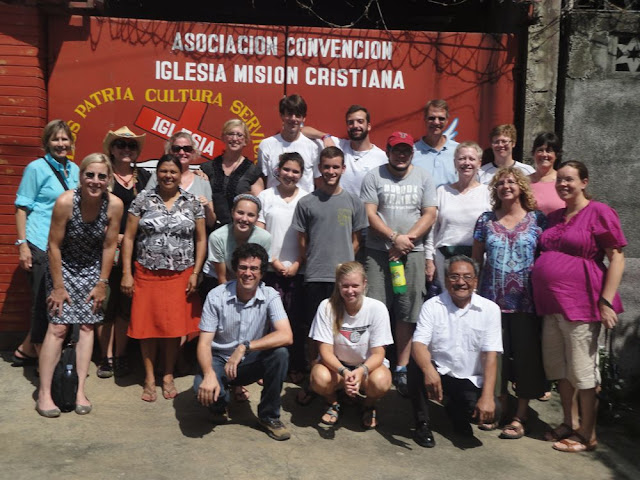We received a very special delegation at the end of July/ beginning of August. Of course, all the groups that visit are special to us, but we really enjoyed helping to host a group that was moving from *knowing about* (saber) La Misión Cristiana and our work with them to really *getting to know* first-hand (conocer) the reality of Nicaragua and the church itself.
University Christian Church in Fort Worth, TX began to learn about the work that Global Ministries supports in Nicaragua because they met us when we spent a weekend with them in May 2010 as part of our preparation for going overseas. When we applied to serve with Global Ministries, they were in the middle of an interesting and challenging process, where they wanted to send new missionaries but needed extra funds to be able to support them. So they were seeking candidates and funds at the same time for ten positions the board had identified as the top priorities around the world. We were the first applicants who found a good fit with one of these positions -- and UCC in Fort Worth was the first church that identified some income from their endowed funds that could support Global Ministries sending a missionary somewhere in the world.
So, shortly after UCC called Global Ministries to share that they were ready to give the funds, we got a call to come in for the interview. And not too long after that, La Misión got the call saying that, if they were willing, they would be receiving us as missionaries. La Misión voted to receive us at their annual General Assembly in March.
When we spent the training weekend in May with UCC, we found out about yet another connection. In 2006, a Disciples minister from Texas had visited Nicaragua, and seen the infamous dump, La Chureca, where families lived in the mounds of trash, eking an existence out of looking for food and things that could be sold. It was a dangerous, unsanitary place for kids and adults alike. She was really depressed about the situation. When she got back to the US, she found out about a project called "Out of the Dump/ Project Chacocente" that was helping move families to a place where they could start new lives, farming small plots of land and living in a community. The project has also opened a school and a lending library in that community, further enriching the lives of the community members.
Rev. Laurie told this story at a youth conference in Texas as an example of how God is working even in situations that seem hopeless. Katie, a young woman who is a member of UCC (and now a college student) was inspired to organize a trip to Nicaragua to work with Chacocente. So she, with the support of Cyndy Twedell (the pastor at UCC who works most with mission, and spent a lot of time with us during our visit there last year) and Pastor Laurie, planned a mission trip that took place just a a few weeks ago. They spent the first part of the week building a classroom at Project Chacocente. They wrapped up their time there by taking some of the families to the beach.

They spent about 3 days with us and La Misión, staying at Centro Emmanuel, the church's training/ hospitality/ conference center in Ticuantepe, a small town just south of Managua.
They met with Rev. Rolando Boniche, the president of the church, and learned from him about some of the history of the church and its current work.

They helped with building a new house for the caretaker at Centro Emmanuel, a somewhat overdue project. (The church administrator said it was only by the grace of God that the old house had stayed standing long enough to be torn down.)



The group also got to experience a bit of Nicaraguan countryside and culture, visiting the Volcan Masaya:

the Catarina mirador:

as well as the traditional craft market in Masaya.
The Sunday night of their visit, they worshipped at the First Christian Mission Church in the Acahualinca neighborhood (not far from La Chureca, one of the many poor neighborhoods in Managua where La Misión churches are found). That was a powerful experience of welcome and unity across cultures for both the congregation and the visiting group. The electricity went on and off throughout the service, but the energy stayed high throughout. (It was also my first time translating a sermon from Spanish into English!)
We enjoyed the opportunity to get to know some of the UCC congregation better -- they were a great group, very flexible, hard-working, and open to new experiences and perspectives -- and they had a lot of fun together. Most of all, it was exciting for us to facilitate their introduction to Nicaragua and La Misión Cristiana.
Quinn loved "our friends from Texas," probably helped by the fact that they brought her presents -- a sweet little stuffed horse and book about a cowgirl that became instant favorites, as well as lots of stickers. :)


It was nice for her to spend time with a large group of English speakers who were interested in talking to and playing with her.